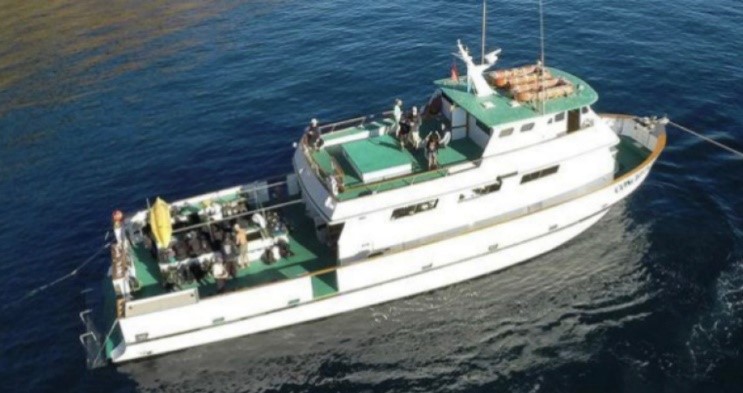Were NTSB’s vessel fire recommendations overlooked?
An L.A. Times investigative report reveals federal agency consistently advised U.S. Coast Guard to implement inspections and maintenance reporting, but without success.
SOUTHERN CALIFORNIA—Federal officials are still trying to determine what caused Conception, a 75-foot dive boat, to become fully engulfed in flames during the early morning hours of Labor Day, which was on Sept. 2. The National Transportation Safety Board (NTSB) reportedly made several safety recommendations during the past 20 or so years, specifically to prevent fires aboard vessels similar to Conception – but those recommendations were overlooked by the U.S. Coast Guard, the only authority authorized to mandate protective requirements, according to an investigative report published by the Los Angeles Times.
The dive boat, while anchored near Santa Cruz Island, caught fire just after 3 a.m. on Labor Day Monday and claimed the lives of 34 people.
The Times reported it reviewed nearly 20 years worth of federal documents and discovered the U.S. Coast Guard failed to implement several NTSB safety recommendations.
Safety issues uncovered by the NTSB – but not addressed by the Coast Guard, according to the Times – were an electrical malfunction, poorly maintained fuel line and failed cooling pump. These issues had caused fires aboard vessels in the past, according to the Times report. Preventative maintenance and crew member fire training were also contributing factors to various fires, the Times report added.
The findings were associated with multiple small vessels and were not attached to Conception, specifically.
NTSB does not have any enforcement power; the Coast Guard is under no obligation to adopt any of the agency’s recommendations. The Coast Guard, conversely, does have “sole authority to mandate safety measures,” according to the Times.
At the heart of the issue is to what extent the Coast Guard should have heeded the NTSB’s recommendations over the past two decades. The NTSB, for example, urged the Coast Guard to require regular inspections and maintenance reporting, according to the Times report. The Coast Guard, however, replied such requirements would be “unnecessary burdensome and duplicative,” also according to the Times report.
Conception was one of California’s worst maritime disasters. The dive boat was quickly and fully engulfed in flames in the early morning hours of Labor Day. The fire claimed 34 lives – only five people were able to escape the disaster. Everyone aboard Conception was on the vessel as part of a weekend diving excursion. Those who died were sleeping below the deck when the fire broke out.
Crew aboard the 75-foot dive boat, which was built in 1981 and reportedly passed its Coast Guard inspections, were not conducting a roving watch at night. The cause of the fire has not yet been determined, though there was a suggestion that too many cell phones were being charged at once. A full report on the fire could still be several months away.


